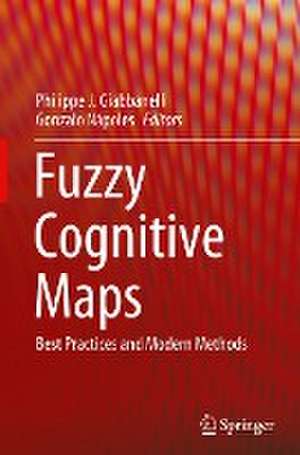Fuzzy Cognitive Maps: Best Practices and Modern Methods
Editat de Philippe J. Giabbanelli, Gonzalo Nápolesen Limba Engleză Hardback – 30 ian 2024
Preț: 933.38 lei
Preț vechi: 1166.72 lei
-20% Nou
Puncte Express: 1400
Preț estimativ în valută:
178.66€ • 194.13$ • 150.17£
178.66€ • 194.13$ • 150.17£
Carte tipărită la comandă
Livrare economică 21 aprilie-05 mai
Preluare comenzi: 021 569.72.76
Specificații
ISBN-13: 9783031489624
ISBN-10: 3031489624
Pagini: 219
Ilustrații: XIII, 219 p. 57 illus., 55 illus. in color.
Dimensiuni: 155 x 235 mm
Greutate: 0.51 kg
Ediția:1st ed. 2024
Editura: Springer Nature Switzerland
Colecția Springer
Locul publicării:Cham, Switzerland
ISBN-10: 3031489624
Pagini: 219
Ilustrații: XIII, 219 p. 57 illus., 55 illus. in color.
Dimensiuni: 155 x 235 mm
Greutate: 0.51 kg
Ediția:1st ed. 2024
Editura: Springer Nature Switzerland
Colecția Springer
Locul publicării:Cham, Switzerland
Cuprins
1. Fuzzy Cognitive Maps: Best Practices and Modern Methods.- 2. Creating an FCM with participants in an interview or workshop setting.- 3. Principles of simulations with FCMs.- 4. Hybrid Simulations.- 5. Analysis of Fuzzy Cognitive Maps.- 6. Extensions of Fuzzy Cognitive Maps.- 7. Creating FCM models from quantitative data with evolutionary algorithms.- 8. Advanced learning algorithm to create FCM models from quantitative data.- 9. Introduction to Fuzzy Cognitive Map-based classification.- 10. Addressing accuracy issues of Fuzzy Cognitive Map-based classifiers.- Index.
Notă biografică
Dr. Philippe J. Giabbanelli received his B.S. from Université Côte d'Azur (France) and his M.Sc. and Ph.D. from Simon Fraser University (Canada). He worked as a researcher at the University of Cambridge (UK) and as a tenure-track faculty at several nationally ranked American universities, where he developed a variety of courses on predictive modeling and artificial intelligence. He taught fuzzy cognitive maps (FCMs) from the perspective of AI, as an object of study for network science, or as a tool in modeling and simulation. His research focuses on developing and applying AI to support population health interventions. He has published about 130 articles (mostly with his students), covering multiple aspects of FCM research from the elicitation and aggregation of causal maps to their structural validation or their combination with other techniques such as agent-based modeling.
Dr. Gonzalo Nápoles received his B.S. and M.Sc. from the Central University of Las Villas (Cuba) and his Ph.D. from Hasselt University (Belgium) and Maastricht University (the Netherlands). Currently, he is a tenured assistant professor at the Department of Cognitive Science and Artificial Intelligence, Tilburg University (the Netherlands). He has taught fuzzy cognitive maps (FCMs) in several courses, including the First Summer School on Fuzzy Cognitive Mapping held in Volos (Greece). His research focuses on developing learning algorithms for FCM models, understanding their mathematical properties, and exploiting their potentialities in pattern classification and time series forecasting settings. He was a recipient of the Cuban Academy of Science Award for his contributions to the FCM field. More recently, his research efforts have shifted toward developing fair machine learning algorithms that can intrinsically be explained (to a large extent) and methods to mitigate implicit and explicit bias.
Textul de pe ultima copertă
This book starts with the rationale for creating an FCM by contrast to other techniques for participatory modeling, as this rationale is a key element to justify the adoption of techniques in a research paper. Fuzzy cognitive mapping is an active research field with over 20,000 publications devoted to externalizing the qualitative perspectives or “mental models” of individuals and groups. Since the emergence of fuzzy cognitive maps (FCMs) back in the 80s, new algorithms have been developed to reduce bias, facilitate the externalization process, or efficiently utilize quantitative data via machine learning. It covers the development of an FCM with participants through a traditional in-person setting, drawing from the experience of practitioners and highlighting solutions to commonly encountered challenges. The book continues with introducing principles of simulations with FCMs as a tool to perform what-if scenario analysis, while extending those principles to more elaborated simulation scenarios where FCMs and agent-based modeling are combined. Once an FCM model is obtained, the book then details the analytical tools available for practitioners (e.g., to identify the most important factors) and provides examples to aid in the interpretation of results. The discussion concerning relevant extensions is equally pertinent, which are devoted to increasing the expressiveness of the FCM formalism in problems involving uncertainty. The last four chapters focus on building FCM models from historical data. These models are typically needed when facing multi-output prediction or pattern classification problems. In that regard, the book smoothly guides the reader from simple approaches to more elaborated algorithms, symbolizing the noticeable progress of this field in the last 35 years. Problems, recent references, and functional codes are included in each chapter to provide practice and support further learning from practitioners and researchers.
Caracteristici
Contains up-to-date guidance for practitioners of fuzzy cognitive maps (FCMs) Includes problems and examples Is a concise, one-volume introduction to the subject
